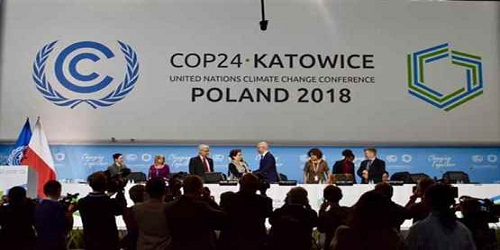From 2nd December 2018, the 24th meeting of Conference of Parties (COP-24) to the United Nations Framework Convention on Climate Change (UNFCCC) also known as ‘Katowice Climate Change Conference’ was held at Katowice, Poland with an aim to finalize guidelines for implementation of the Paris Agreement adopted in 2016. The event concludes on 14th December 2018.
 Major Sessions held in the conference:
Major Sessions held in the conference:
- The 24th session of the Conference of the Parties (COP 24) to the UNFCCC.
- 14th Meeting of the Parties to the Kyoto Protocol (CMP 14).
- The Conference of Signatories to the Paris Agreement (CMA 1).
Vision of the COP24 meeting:
- Adoption of a decision ensuring full implementation of the Paris Agreement.
- Meeting the target of Global Warming to below 1.5 Celsius as reported in Special Report on Global Warming of 1.5 °C (SR15) which was published by the Intergovernmental Panel on Climate Change (IPCC).
- Discussion on Fiji-led Talanoa Dialogue, the first-ever international conversation of its kind to assess progress towards the goals of the Paris Agreement, including the goal of limiting global temperature increases.
About Poland:
♦ Capital: Warsaw
♦ Currency: Polish złoty
UN conference on climate change held in Poland
From 2nd December 2018 to 14th December 2018, the annual meeting of United Nations climate change conference (COP24) was held in the Polish city of Katowice, with the goal of finalising the rules for implementation of the Paris Agreement on climate change under the Paris Agreement work programme (PAWP).
Key Points:
- Michal Kurtyka was the President of Conference of Parties 24 (COP24) meeting in which about 20 thousand delegates from about 200 countries, including politicians, representatives of non-governmental organizations, scientific community and business sector took part.
- Dr Harsh Vardhan, Union Environment Minister, led the 17 member Indian delegation to the conference.
- The major success of the conference was the agreement from the delegates of 196 countries on a rule book officially titled as the Paris Agreement Work Programme, to govern the implementation of the 2015 Paris climate treaty.
- Developed countries, led by Germany and Norway, pledged financial support for the second replenishment of the Green Climate Fund, which is currently depleted while the World Bank promised $200 billion in climate action loans for the period 2021-2025.
- Difficult questions such as ways to scale up existing commitments on cutting emissions, ways to provide financial help for poor countries and whether countries are doing enough to cut their emissions were postponed to the next conference because of disagreement between different stakeholders.
About United Nations Framework Convention on Climate Change (UNFCCC):
UNFCCC a “Rio Convention”, is an international environmental treaty adopted on 9th May 1992 and opened for signature at the Earth Summit in Rio de Janeiro from 3rd to 14th June 1992. It entered into force on 21st March 1994 with 197 ratifies till date.
Union Environment Minister Dr. Harsh Vardhan Lead the Indian Delegation at COP-24
The Union Environment Minister, Dr. Harsh Vardhan led the 17 member Indian delegation to the United Nations Framework Convention on Climate Change (UNFCCC) which organized the 24th meeting of Conference of Parties (COP-24) in Katowice, Poland.
Key Points:
- India strongly supported the objective of the Paris Agreement to strengthen the global response to the threat of climate change by keeping the global temperature rise this century well below 2 degrees Celsius above pre-industrial levels.
- India pursued efforts to limit the temperature increase to 1.5 degrees Celsius.
- The Minister announced that India launched a nationwide campaign in preserving the environment called the Green Good Deeds Movement that will ensure that each and every citizen must adopt measures to protect the environment by doing small but significant green good deed.
- India also set up a pavilion on the sidelines of COP-24, themed as ‘One World One Sun One Grid’ to create awareness about India’s positive climate actions in various sectors of the economy.
- India emphasized on giving due consideration to challenges and priorities of developing countries, their vulnerabilities, development priorities like eradication of poverty, food security, energy access, providing health infrastructure etc.
About Ministry of Environment, Forest and Climate Change:
♦ Minister: Harsh Vardhan
♦ Headquarters: New Delhi
Gujarat’s women group gets UN award
On 11th December 2018, a Gujarat women’s group got a United Nations Framework Convention on Climate Change (UNFCCC) award for women’s leadership with low cost and sustainable technology to tackle storms, at a side event of the on-going 24th Conference of the Parties (COP24) in Katowice, Poland.
Key Points:
- Gujarat was given the Gender Just Climate Solutions Award of the Women and Gender Constituency in the technical category, one of the nine stakeholder groups of the UNFCCC.
- The award was given for a technology named Bhungroo which protects groundwater via a filtration system and increases soil fertility by reducing salinity.
- This technology has helped the Gujarat, which is prone to short periods of heavy rains and flooding, followed by long droughts, to tackle the severe impacts of excessive rainwater from storms.
- Each installed “Bhungroo” unit provides food security for 30 to 100 people, generating an additional income of about $5700 per year.
About Gujarat:
♦ Chief Minister: Vijay Rupani
♦ Governor: Om Prakash Kohli
Operating guidelines for Paris Agreement adopted at COP24
On 15th December 2018, delegates from 196 countries agreed on a rule book to govern the implementation of the 2015 Paris climate treaty during the on-going 24th Conference of the Parties (COP24) organised by the United Nations Framework Convention on Climate Change (UNFCCC) in Katowice, Poland
Key Points:
- The agreement named as the Paris Agreement Work Programme (PAWP) aims to keep global temperature rise to below 2° Celsius and will be operational by 2020.
- The common rule book allows for flexibility for poorer countries in regulations for cutting carbon emissions.
- It also states the regulations which will govern the details of how countries are supposed to cut carbon emissions, how finance will be provided to poorer nations, and ensure the regulations are being followed.
- The “loss and damage measures” included in the agreement will see rich countries paying poorer ones to help them fight the effects of climate change which they are already experiencing.
- India raised a formal reservation over a few provisions in the final agreement relating to a stock take exercise of all climate actions in 2023 which did not adequately reflect the principles of equity and differentiated responsibilities.
About Conference of the Parties (COP):
Conference of the Parties (COP) is the supreme body of the UNFCCC Convention. It consists of the representatives of the countries that have ratified the UNFCCC Convention. Countries that have ratified the convention are called Parties to the Convention. The COP holds its sessions every year and takes decisions which are necessary to ensure the effective implementation of the provisions of the Convention and regularly reviews the implementation of these provisions.




